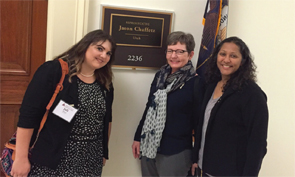
Legislators take their constituents seriously, which is why it’s important for physicians, patients and rheumatology health professionals to take an active role in advocating for issues important to rheumatology. Shown here (from left), Juli Jensen (patient), Monica Snowden, MD, and Elizabeth Etherton, CNP, take rheumatology to the Hill. Courtesy Elizabeth Etherton
Over the past several years, the ACR has ramped up its efforts in advocacy. Under the leadership of the Government Affairs Committee, many ACR staff, members and their patients, considerable progress has been made moving priority issues forward in 2015.
A few highlights from 2015 include:
- The Patients’ Access to Treatment Act (PATA) was introduced into Congress. This legislation would make specialty therapies, including biologics, more affordable for patients by limiting cost-sharing requirements.
- The ACR successfully advocated with the Food and Drug Administration (FDA) for biosimilar products to have distinguishable names. Additionally, biosimilar notification legislation was passed by more than 10 states. These important regulatory and legislative actions will help ensure the health and safety of patients who are prescribed biologics or biosimilar therapies.
- Funding was reinstated to the arthritis program at the Centers for Disease Control and Prevention (CDC). This funding allows the CDC to continue operating a range of arthritis research, awareness and intervention programs.
- The ACR played a leading role in the introduction of an ICD-10 safe harbor implementation period. The CMS announced that claims will not be rejected during the next year because of selecting the wrong ICD‑10 subcode—a small victory for doctors.
- The ACR was able to bring 35 patient advocates to Washington, D.C., in 2015 for more than 300 meetings with lawmakers. There is no substitute for lawmakers hearing from constituents on how policies affect them directly.
- Patient advocates used Simple Tasks’ new Legislative Action Center to send more than 320 emails to members of Congress about issues affecting rheumatic disease patients.
With an ongoing effort from ACR members and patients, we can continue to advance legislation that supports rheumatology in both the House and the Senate, and have it signed into law. To continue to be successful in advancing legislation, the ACR relies on dedicated grassroots advocates who are willing to go the extra mile to push their elected officials. Advocacy methods include emails, in-district visits and calls.
Get Your Patients Involved
It’s crucial to remember that all legislators—on the federal, state and local levels—are politicians whose continued success depends on their ability to satisfy voting constituents. Re-election, recognition and status are powerful motivators. Effective grassroots advocacy can wield as much influence on these outcomes as the biggest corporation or trade association.
[To advance legislation], the ACR relies on dedicated grassroots advocates who are willing to go the extra mile to push their elected officials.
There is no substitute for lawmakers hearing from constituents on how policies affect them directly. Because of this, grassroots advocates are at the heart of our strategy. In order for us to effect meaningful change, we all must get involved and do something to benefit the future of our patients and our profession. Continued success depends on the involvement of ACR members and patients across the country.

